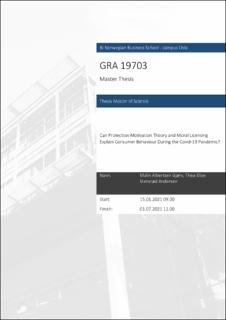Can Protection Motivation Theory and Moral Licensing Explain Consumer Behaviour During the Covid-19 Pandemic?
Master thesis
Permanent lenke
https://hdl.handle.net/11250/2825570Utgivelsesdato
2021Metadata
Vis full innførselSamlinger
- Master of Science [1621]
Sammendrag
This thesis addresses how protection motivation theory and moral licensing can
explain consumer behaviour in times of crisis, using the Covid-19 pandemic as a
context for the research. The results of 53 in-depth interviews illustrate that the
perceived threat of Covid-19 influences both threat and coping appraisal, and
consequently also licensing effects due to the sacrifices associated with protective
behaviours. The research provided interesting discoveries regarding the
significance of perceived Covid-19 threat and response costs on consumers’
motivation to engage in protective behaviours. Specifically, the findings
uncovered a great perceived threat manifested in spreading the virus. In fact, it
appeared that a common motivation for engaging in protective behaviours was to
protect vulnerable groups from infection. Further, it also appeared that consumers
willingly complied with the restrictions and recommendations despite the great
response costs. The research also investigated whether sacrifices associated with
protective behaviours triggered licensing effects among consumers. The results
uncovered situations where such sacrifices may provide consumers with a moral
license to engage in self-destructive behaviours. Similarly, the findings also
revealed that some of the respondents who sacrificed travel might gain a moral
license to engage in environmentally damaging behaviours. Consequently, the
findings from this research make an important contribution to understanding how
consumers react to threat and restrictions caused by responses to the Covid-19
pandemic, and may also be relevant in case of future hazards.
Beskrivelse
Masteroppgave(MSc) in Master of Science in Strategic Marketing Management - Handelshøyskolen BI, 2021
